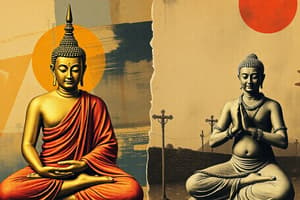Podcast
Questions and Answers
What is the path to the end of suffering according to the Four Noble Truths?
What is the path to the end of suffering according to the Four Noble Truths?
- Reincarnation
- Right Understanding
- Desire and attachment
- The Eightfold Path (correct)
What is the root cause of suffering according to the Four Noble Truths?
What is the root cause of suffering according to the Four Noble Truths?
- Desire and attachment (correct)
- Right Understanding
- Karma
- Nirvana
What is the ultimate liberation in Jainism as mentioned in the text?
What is the ultimate liberation in Jainism as mentioned in the text?
- The Eightfold Path
- Nirvana
- Reincarnation (correct)
- The Truth of Suffering
Which teachings are considered central in both Buddhism and Jainism?
Which teachings are considered central in both Buddhism and Jainism?
According to the text, what can be eliminated by following the Eightfold Path?
According to the text, what can be eliminated by following the Eightfold Path?
What arises from desire and attachment according to the Four Noble Truths?
What arises from desire and attachment according to the Four Noble Truths?
What is the ultimate goal of Nirvana in Buddhism?
What is the ultimate goal of Nirvana in Buddhism?
In Jainism, what is the ultimate goal called?
In Jainism, what is the ultimate goal called?
What is Karma in Buddhism and Jainism?
What is Karma in Buddhism and Jainism?
What is Ahimsa in Buddhism and Jainism?
What is Ahimsa in Buddhism and Jainism?
What do both Buddhism and Jainism believe in regarding the cycle of birth and death?
What do both Buddhism and Jainism believe in regarding the cycle of birth and death?
What does Buddhism emphasize in addition to Nirvana?
What does Buddhism emphasize in addition to Nirvana?
What does Jainism focus on in addition to the concept of Moksha?
What does Jainism focus on in addition to the concept of Moksha?
What are the consequences of good actions according to Karma?
What are the consequences of good actions according to Karma?
What are the consequences of bad actions according to Karma?
What are the consequences of bad actions according to Karma?
Flashcards are hidden until you start studying
Study Notes
Buddhism and Jainism: A Comparative Study
Buddhism and Jainism are two ancient religions originating in the Indian subcontinent, both of which have had a profound impact on the spiritual and cultural landscape of the region. While there are significant differences between the two, they share some common beliefs and practices. In this article, we will explore the similarities and differences between Buddhism and Jainism, focusing on the subtopics: Four Noble Truths, Nirvana, Karma, Ahimsa, and Reincarnation.
Four Noble Truths
The Four Noble Truths are central teachings in both Buddhism and Jainism. These truths are:
- The Truth of Suffering: Life is characterized by suffering, which arises from desire and attachment.
- The Truth of the Cause of Suffering: The root cause of suffering is desire and attachment.
- The Truth of the End of Suffering: Suffering can be eliminated by following the path of Right Understanding, Right Thought, Right Speech, Right Action, Right Livelihood, Right Effort, Right Mindfulness, and Right Concentration.
- The Truth of the Path to the End of Suffering: The Eightfold Path is the path to the end of suffering, leading to the attainment of Nirvana in Buddhism or the ultimate liberation in Jainism.
Nirvana
Nirvana is the ultimate goal in Buddhism, representing the complete cessation of suffering and the attainment of enlightenment. It is a state of perfect peace, freedom from the cycle of birth and death (samsara), and the realization of the true nature of reality. In Jainism, the ultimate goal is also liberation, known as Moksha, but it is not as clearly defined as Nirvana in Buddhism.
Karma
Karma, the law of action and reaction, is a central concept in both Buddhism and Jainism. It is the belief that every action has consequences, and these consequences determine the nature of the next life. Good actions lead to a better rebirth, while bad actions lead to a worse rebirth. The ultimate goal in both religions is to break the cycle of karma and achieve liberation.
Ahimsa
Ahimsa, or nonviolence, is a fundamental principle in both Buddhism and Jainism. It is the practice of abstaining from causing harm to any living being, through speech, thought, or action. Ahimsa is considered the highest virtue in both religions and is essential for achieving the ultimate goal of liberation.
Reincarnation
Both Buddhism and Jainism believe in the concept of reincarnation, or the cycle of birth and death. The soul is believed to be reborn in a new body after death, and the nature of the next life is determined by the actions of the past life. The ultimate goal in both religions is to break the cycle of reincarnation and achieve liberation.
In conclusion, while Buddhism and Jainism share some common beliefs and practices, such as the Four Noble Truths, Nirvana, Karma, Ahimsa, and Reincarnation, they have distinct differences in their teachings and practices. Buddhism emphasizes the importance of the Eightfold Path and the attainment of Nirvana, while Jainism focuses on the concept of Moksha and the 14 vows of the Jain monk. Despite these differences, both religions share a common goal of achieving liberation from the cycle of birth and death and the cessation of suffering.
Studying That Suits You
Use AI to generate personalized quizzes and flashcards to suit your learning preferences.




